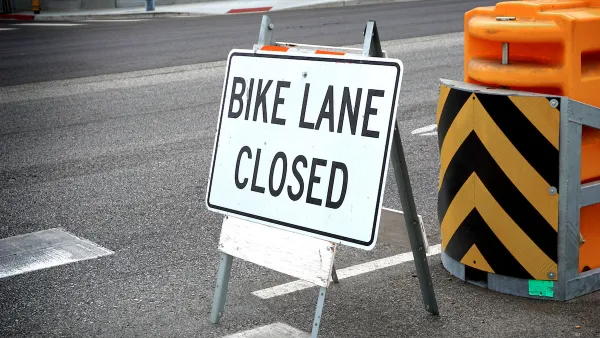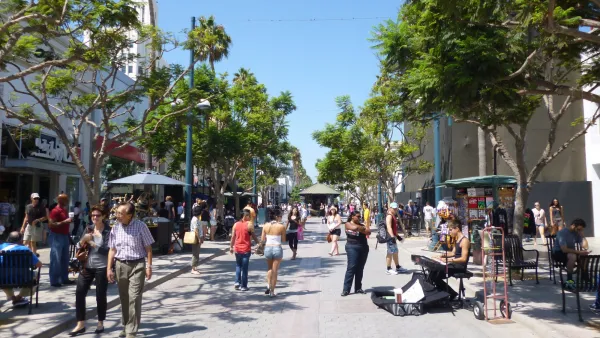This week L.A. City Council members voted to approve an ordinance that gives the city more flexibility to lower parking requirements in select areas of the city to encourage adaptive reuse and walkability, report David Zahniser and Kate Linthicum.
Supported by members of the business community and advocates of the city's "elegant density" policy that "seeks to channel growth along the city's expanding rail and bus corridors," the Modified Parking Requirement District ordinance was spearheaded by Council members in the Eastside and Central City with the goal of sparking "investment
in century-old neighborhoods designed without the car in mind," write Zahniser and Linthicum.
According to James Brasuell, writing in Curbed Los Angeles, "The ordinance allows for the creation of Modified Parking Requirement
districts that allow the use of 'one or more' of 'seven parking
requirement modification tools.' As explained in September,
those tools are: 1) change of use parking standards (i.e., if a
building's use changes, parking requirements won't), 2) use of a new
Parking Reduction Permit (individual projects could request fewer
required parking spaces), 3) buildings could move parking off-site to
within 1,500 feet, 4) decreased parking requirements, 5) increased
parking requirements, 6) commercial parking credits, and 7) maximum
parking limits (each use within a district has a set maximum number of
spaces)."
The ordinance is not without its critics, however, and one Councilmember, Paul Koretz, "who represents traffic-choked neighborhoods on the Westside," voted against it.
"Neighborhood activist Mike Eveloff, a Koretz constituent, said the
parking changes rely on 'wishful thinking' and the mistaken assumption
that when driving cars becomes too inconvenient, people will 'just not
use them,'" write Zahniser and Linthicum. "The winners in Tuesday's vote, he said, will be real estate
developers, who will no longer have to spend tens of thousands of
dollars to build parking spaces."
FULL STORY: Los Angeles might ease up on parking requirements for businesses

Analysis: Cybertruck Fatality Rate Far Exceeds That of Ford Pinto
The Tesla Cybertruck was recalled seven times last year.

National Parks Layoffs Will Cause Communities to Lose Billions
Thousands of essential park workers were laid off this week, just before the busy spring break season.

Retro-silient?: America’s First “Eco-burb,” The Woodlands Turns 50
A master-planned community north of Houston offers lessons on green infrastructure and resilient design, but falls short of its founder’s lofty affordability and walkability goals.

Test News Post 1
This is a summary

Analysis: Cybertruck Fatality Rate Far Exceeds That of Ford Pinto
The Tesla Cybertruck was recalled seven times last year.

Test News Headline 46
Test for the image on the front page.
Urban Design for Planners 1: Software Tools
This six-course series explores essential urban design concepts using open source software and equips planners with the tools they need to participate fully in the urban design process.
Planning for Universal Design
Learn the tools for implementing Universal Design in planning regulations.
EMC Planning Group, Inc.
Planetizen
Planetizen
Mpact (formerly Rail~Volution)
Great Falls Development Authority, Inc.
HUDs Office of Policy Development and Research
NYU Wagner Graduate School of Public Service




























